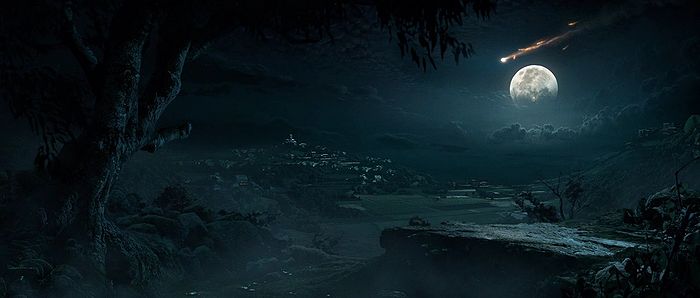Difference between revisions of "Cinematic"
m (→Diablo II: LoD Cinematics) |
m (→Diablo II: LoD Cinematics) |
||
| Line 111: | Line 111: | ||
| valign="top"|'''Diablo 2: Lord of Destruction Final Cinematic''' | | valign="top"|'''Diablo 2: Lord of Destruction Final Cinematic''' | ||
| − | <youtube> | + | <youtube>240o-hYai8M</youtube> |
<span style="font-size:85%; color:#C0C0C0;"> | <span style="font-size:85%; color:#C0C0C0;"> | ||
Revision as of 11:51, 26 July 2010
Cinematics or cut-scenes are movies seen in the game, or released as promotional tools, that tell the game story, introduce new characters, or just generally serve as promotion or advertising. Blizzard has a long history of producing high quality movies through their in-house Cinematics Team, and these have been included with every game they've released since WarCraft II.
Contents
Diablo 3 Cinematics
As of December 2009, there have been three Diablo 3 cinematics released. Click to the linked pages to see each cinematic, as well as screenshots and plot details.
- Cinematic: WWI 2008 was the first, released with Diablo 3's premiere at the Paris WWI event, June 2008. This cinematic introduces the game world, hints at the plot, and shows some great scenery.
- Cinematic: Wizard was the second cinematic, released at Blizzcon 2008. This machinima style movie introduced the Wizard character, and showed her marching boldly through the Tristram Cathedral, en route to a final battle with Leoric, the Skeleton King.
- Cinematic: Monk was the third cinematic, released at Blizzcon 2009. This machinima style movie introduced the Monk character and showed him battling Cultists in Arcarnus, before a final battle against a Morlu Caster.
Final Game Cinematics
There will be extensive cinematics in the full game, approximately as many as we saw with Diablo 2, with the movies shown before the game, between each act,[1] and after, much as they were in Diablo 2. Kevin Martens and Julian Love commented on that during a Blizzcon 2009 interview: [2]
- Diii.net: Can you comment on the cinematics? The overall length and presentation? When will players see them during the game, and how long will they run for?
- Kevin: That’s not really been decided, since they’re still a work in progress. Currently the plan is to show some at the beginning and end of each Act, but the exact structure isn’t yet finished.
- Diii.net: Any idea how long they’ll be in total? Comparable to D2?
- Kevin: We really don’t know yet, since all of the scripts aren’t finished.
Jay Wilson also addressed this subject during a press conference at Blizzcon 2009. [3]
- We're using cinematics to about the same level as Diablo II did.
- It's a difficult story to tell with cinematics because we basically have a main character who can't be in the cinematics. We've really focused on the ancillary characters - Their focus is always to be kind of implying the player's presence right outside the room on the other side of that door.
- We don't have a big focus on in-game cinematics. We try to tell our story through action, through questing, and through events. We do have a lot more scripted events, but we separate those from in-game cinematics in the fact that we don't pull control away from the player.
Cinematics vs. Machinima
Beginning with World of Warcraft, Blizzard started to produce two types of cinematics. The traditional, fully CG cinematics are animated short movies about the games. These are produced by the Blizzard cinematics team in much the way a movie company like Pixar creates their feature films, and while these movies originate from the same concept art and designs as the rest of the game, almost all of the artwork and environments are created from scratch for the film.
The newer type of "cinematic" that's been used extensively to promote World of Warcraft and now Diablo 3, is created with the game engine itself. This technique is known as Machinima, and players can make this type of movie themselves, simply by recording what their character sees as they play. The better fan made movies are edited down from many hours of footage, and usually add soundtracks, dialogue, and sometimes even original special effects and animations. One fine WoW example can be seen here.
Red vs. Blue, A fan-made series using the Halo game engine, has become a huge internet success, with episodes even being sold on DVD with the consent of game publisher Microsoft.
D3 Machinima Confusion
The fact that players never have the "first person" view while playing Diablo 3 (unlike WoW machinima movies) is probably what's led to some of the confusion, and various members of the Diablo 3 team have repeatedly had to explain[4] that those movies are not "true" cinematics. [5]
- Joystiq.com: Monk introduction cinematic was choppy in a few places, it looked a little rough. You know, usually Blizzard's cinematics are so gorgeous and everything looks like it's out of a CGI movie. Was that put together in-game? How did you guys create that?
- Leonard Boyarsky: Yeah, that's an in-game done by our AV team. We have two different ways of doing them. A lot of times when they announce patches for World of Warcraft, you'll notice that they'll do in-game ones as opposed to full-on cinematic ones. That's what that one was. Same with our Wizard one last time. They were developing that as we were developing a lot of his skills. I think they did a really good job with the limited tools that we allowed them to have at the time. [laughs] But I thought it was really cool, myself. But I know what you're saying.
Yeah, there was a few times where you were like, "Oh, it's a little choppy" or some of the characters in the background looked all the same, you know. They're facing the same way, moving the same way.
- Kevin Martens: They didn't get the assets very early; they didn't have more time.
- Leonard: We'll take full responsibility for that. [laughs].

Diablo II
Diablo II: LoD Cinematics
There are two cinematics in Diablo II: Lord of Destruction. The intro cinematic as well as the final ending cinematic, with the destruction of the Worldstone by the hand of Tyrael.
| Diablo 2: Lord of Destruction Intro Cinematic
The Search for Baal |
Diablo 2: Lord of Destruction Final Cinematic |
Diablo II Cinematics
| The Calling
The Calling, is the introductory cinematic to Diablo 2. It was produced in-house by the Blizzard Film Department and released in March 2000. It runs for 7:10. |
Diablo II Commercials & Trailers
These are some of the original Diablo II trailers and commercials. Some of these have been largely forgotten.
| Diablo 2 Lord of Destruction Trailer - ECTS 2000 / E3 2001
The first Diablo II: Lord of Destruction trailer shown. It's a compilation of what would later be the intro cinematic to the expansion, but also mixed in with plenty of detailed pictures of the Worldstone, some of which are exclusive to this particular trailer. |
Diablo 2 TV Commercial - Xmas 2000 #2
Compilation of Diablo II cinematics in a TV spot. |
| Diablo 2 TV Commercial - Xmas 2000 #1
The classic 2000 Christmas commercial for Diablo II. A must-see. |
Diablo 2 Cinematic Trailer - E3 1999
The 1999 E3 cinematic is much closer to the actual game. This is basically a collage of little cuts from the in-game cinematics, rearranged for dramatic effect. The voiceover does actually talk of basically everything that will happen in the game (and expansion), which is kind of interesting. |
| Diablo 2 Cinematic Trailer - E3 1998
This cinematic trailer shows the Dark Wanderer on his travels from Tristram. This cinematic is forgotten by most, and none of it is available in the game. Some of the facts here have of course since been retconned, such as the stitchings and the mention of "many months have passed", when in fact only a number of weeks, at most, would have passed. Whatever those gates are is unknown, but it could be the Rogue Monastery pass gates for caravans (caravans can hardly be asked to travel through the Monastery cellar!). The big red stone seems very much to be Diablo's Soulstone, which of course can't just have been dropped on the way. If this was just for effect, or some earlier story arc the team was playing with, we don't know. We DO know that the Wanderer did not lose the stone, so perhaps he ran back and picked it up. |
Diablo 2 Announcement Cinematic - ECTS 1997
The first announcement trailer for Diablo II. Possibly being pictures of Tristram Cathedral as it's being attacked by demons after the Dark Wanderer left the scene. It could also be just some random church on fire, as this was so early in development, it's likely the entire story line was not ironed out by then. It's interesting to note that much of this 3D rendered material did not make it into any of the games. |
Diablo I
As Diablo I came out in a time before video games were widely advertised, there's no Diablo I commercials, but there are deleted scenes that were made, but never added to the game!
Diablo: Hellfire Intro
| Diablo: Hellfire Intro
This is the intro cinematic for Diablo: Hellfire, the official, but unsuported expansion of Diablo I made by Sierra Entertainment. |
Diablo I Cinematics
| Diablo I Intro Cinematic
Welcome to the world of Diablo. this is the first ever Diablo cinematic, introducing people to the dark world of Sanctuary, as Tristram has been invaded by a demonic force. |
Lazarus
The first cutscene of the game is showing the Archbishop Lazarus at the Tristram Cathedral's altar, at a point where he's clearly corrupted by Diablo. After this cutscene was shown, it leads to the player's confrontation with Lazarus and his succubus guards. |
| Warrior Ending Cinematic
We don't know why exactly some snippets were removed, possibly to save some programming, but there used to be one ending per class, but in the final game, it's only the Warrior you can see. |
Diablo Ending Cinematic
The last cinematic of Diablo I. We see the Dark Wanderer standing We don't know why exactly some snippets were removed, possibly to save some programming, but there used to be one ending per class, but in the final game, it's only the Warrior you can see. |
Diablo I Deleted Scenes
As mentioned above, Diablo I came with deleted scenes. It's not clear why some of them were removed, but they still exists in the game files, and as such are shown here. They have never officially been released.
| Butcher Intro
This Butcher introduction was removed before the game went live, and it's the scene fans are most surprised was deleted. It's a tad gruesome, yes, but there's corpses and death all over the game, so it seems unlikely to be because of censorship. |
Map of the Stars
The Map of the Stars cut-scene was specifically removed since the quest itself was considered ruining the player-driven nature of the game. You can see the original Diablo render here doing something with these stars. |
| Rogue Ending Cinematic
The first of two additional ending scenes that exist for Diablo I, but was not officially part of the game. |
Sorcerer Ending Cinematic
The second of two additional ending scenes that exist for Diablo I, but was not officially part of the game. |
